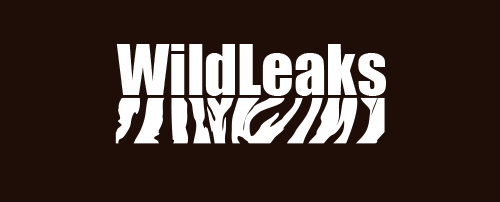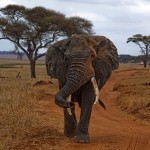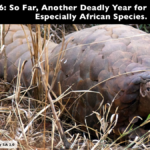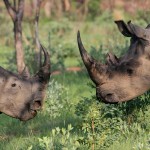
On February 7, 2014, Andrea Crosta announced the launch of WildLeaks, a non-profit collaborative project that allows for the secure and confidential receipt and assessment of information and tips related to wildlife and forest crimes.
This new high-tech ally in the fight against poaching and wildlife crime has generated considerable media buzz, and WildLeaks has garnered the support of numerous other non-governmental organizations and law enforcement agencies alike. Last week, a little more than a month after its launch, I had the opportunity to talk to Andrea, project leader and founder, regarding the current state of WildLeaks:
Why did you establish WildLeaks? What is its purpose?
WildLeaks is a project created and funded by the Elephant Action League, an organization that I established a year ago in California for the exact purpose of creating and implementing new and innovative initiatives to fight wildlife crime. I hoped to apply my professional management experience and contacts in the field of international investigations and homeland security to wildlife and forest crime issues.
I think that the global fight against wildlife crime, which we are not winning, is still based on old approaches, outdated working methodologies, and ineffective strategies, not to mention poor coordination across organizations and agencies involved, and an unfair monopoly enjoyed by a few very large conservation NGOs.
The criminal syndicates and groups behind wildlife crime are always ahead of us. They are more coordinated, faster in their decisions and better connected. New and innovative approaches are urgently needed. So WildLeaks is the first of a series of projects that we are going to launch in the next months and years that try to jump ahead of the bad guys. With WildLeaks, everyone in our global civil society can now play their part with the first international platform for whistleblowers against these crimes.
Why do you think there wasn’t anything similar available previous to WildLeaks?
Although some local organizations and law enforcement agencies already had systems, like hotlines, to report crimes including wildlife crimes, I wanted to launch a global independent initiative, not affiliated with any large NGO or law enforcement entity, and to provide a state-of-the-art secure, anonymous platform to cover the world.
Why is anonymity and confidentiality important to the WildLeaks concept?
Wildlife and forest crimes are almost always perpetrated by dangerous groups of people, often in collaboration with corrupt government officials. Especially in some countries, this ‘environment’ makes it difficult and at times dangerous to report on crimes like poaching, illegal trade and illegal logging. That’s why it is important to provide the public with a modern and very secure anonymous platform through which they can send information, including photos, videos and in fact any kind of file.
To accomplish this we decided to implement our platform using the Tor technology, which was created in order to provide people with the possibility to navigate the Internet anonymously. It is made up of a chain of proxies that work to hide the users’ original IP address (your Internet identity).
If you report from a country with an oppressive regime, for example, this system allows you to browse the Internet, contact us, and provide information anonymously.
How do you prioritize actions you will take with information received, ie. whether it is turned over to law enforcement, further investigated by Wildleaks partners or turned over the media?
Highly experienced and responsible professionals, investigative reporters and ex-law enforcement officers evaluate documents and tips provided to WildLeaks.
After anonymous information is received, evaluated and validated by WildLeaks, and this can take a while, we work to transform this information into an actionable item, such as launching an investigation or sharing it with the media or, when possible, with selected and trusted law enforcement officers. We decide case by case if it’s better and more useful to facilitate an investigation or leak it to the media. There’s no rule, each case is assessed based on its own particular circumstances.
The idea and goal is to pass on validated information to where it will do the most good. The priority is always to prevent wildlife crimes, when possible, and to facilitate the identification, arrest and prosecution of individuals and organizations behind wildlife and forest crimes.
WildLeaks has been up and running now for a little over a month. Has it received valuable information on wildlife or forest crime? From where? What types of topics/issues?
It was amazing to see, from day one, that so many people were willing to get involved and provide information on wildlife crimes. WildLeaks received the first leak within 24 hours from the time of launch and since that time it has never stopped. WildLeaks has received information from all over the world, from the U.S., Indonesia, Africa, Australia and Europe. I cannot elaborate much on the details of the topics because we are still working on most of them, but I can mention in general that the information includes issues related to the illegal import of wildlife products into the U.S., poaching in Indonesia, illegal logging in Africa, illegal trophy hunting in Southern Africa, illegal killing of predators in Northern Europe and even interesting information related to ivory smuggling into China.
Are there any successes you can report yet?
These things take time, it will likely be a while before we can show the public concrete results, like arrests or prosecutions of those involved in wildlife or forest crime. Most of the work we are doing now is preliminary assessments, done behind the scenes and it is a very deliberative process done with caution and a lot of care. But I’m happy to tell you that we have already shared an interesting leak with a well-known national law enforcement agency and another tip with two NGOs working on the ground to address that very issue. We are actively working on four additional leaks and the information just keeps coming in. Not bad for the first month of life!
How has WildLeaks been received by law enforcement? What about other organizations?
Apart from receiving a lot of emails from the public praising our initiative, in general, I can say that WildLeaks has been very well received by many organizations. We are currently formally collaborating with seven organizations, who are listed on our website, and are in discussion with an additional seven organizations that have proposed interesting partnership opportunities.
We have also received informal blessing from a few law enforcement agencies. Although we are completely independent and not affiliated with any law enforcement entity, we do collaborate with them, when needed, and they see us as a potential useful tool.
How can other organizations or individuals become involved or support WildLeaks?
First of all, society in general has to reevaluate and support the role of whistleblowers. The idea behind the term is that of a whistle-blowing referee. You see something wrong and you blow the whistle. Citizens should start seeing themselves as referees. If you see somebody committing a crime against wildlife you blow the whistle and we’ll try to take care of it.
Second, individuals or organizations can support WildLeaks by spreading the word about this new initiative which can be a very powerful tool against wildlife crime. The more people know that they can share confidential information with an experienced, independent group of professionals, through a secure and anonymous system, the more information about wildlife and forest crimes will be shared with those best able to address it.
For more information or to report information about wildlife or forest crimes see www.wildleaks.org




